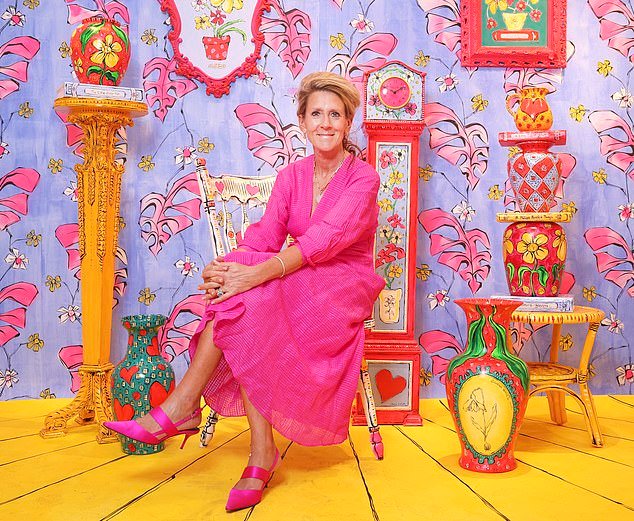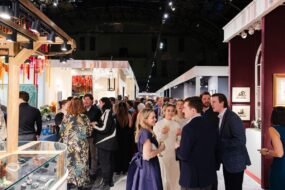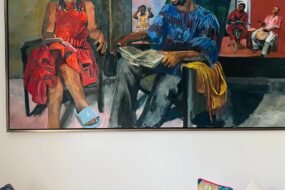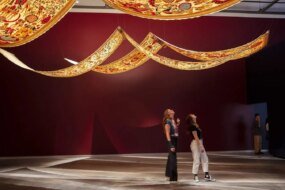
Arriving at the Clarendon Fine Art gallery on London’s swanky Marylebone High Street I’m engulfed by a blaze of colour – the work of Leicestershire artist Jonjo Elliott ahead of an exhibition where the great and good of the British art world will sip sparkling wine and appraise his wares.
It is in this melange that I meet Beth Butterwick, the boss of Clarendon’s, the largest chain of art galleries in Britain.
The former womenswear boss, 59, is herself awash with colour, in a bright pink dress and matching heels that almost allow her to blend in with the paintings on the walls.
While it would be easier to discuss the colourful works, Butterwick is more interested in a topic at the top of the agenda for many high street firms – the tourist tax.
In 2021, the Government ended the ability for overseas tourists to claim back the 20 per cent VAT levied on shopping, in a move criticised by retailers, hoteliers and hospitality firms for dealing a blow to the economy, with foreign shoppers turning elsewhere for deals.
A fresh threat to the UK’s status as a tourism hub emerged last month when Deputy Prime Minister Angela Rayner backed calls for a tax on hotel stays for foreign visitors.

Brushed off: Beth Butterwick, head of Clarendon’s, which has 76 galleries in the UK
Butterwick says both only undermine the UK economy for a negligible benefit to the Treasury, adding: ‘This is not just about London. This is about our entire economy. Businesses have already been hit by the Budget, so we need to stimulate growth and make ourselves an attractive destination for investment from global businesses.’
Of the tourist tax, she says: ‘We have 76 galleries across the UK and it is affecting every city centre and every high street.’ Despite Britain being the world’s second-largest art market after the US, Butterwick says the sector is under threat as the lack of tax-free shopping means art connoisseurs are looking elsewhere.
‘The British art market is worth £9 billion a year,’ she says. ‘But while the US has prospered this year, the UK has suffered. The majority of our visitors are from America or the Middle East and are more savvy about price comparisons now and will shop around.
‘Shopper numbers have recovered from the pandemic much better in Europe than in the UK. I’m sure the tourist tax has something to do with that.’
Despite intense pressure from businesses and a campaign from this newspaper, Chancellor Rachel Reeves declined to reinstate tax-free shopping for tourists in her Budget last autumn, instead clobbering the High Street with a rise in National Insurance Contributions and an inflation-busting increase to the minimum wage.
With the next Budget looming, Butterwick called on her to give the sector a much-needed boost.
She said: ‘The tourist tax was an own goal by the previous government. So Reeves had a fantastic opportunity to show that, first of all, they are serious about driving growth, and that they’re serious about listening to businesses.

‘We’ve got 6.8 million people working in the retail and hospitality sector and it contributes 12.5 per cent of government revenue. But it’s faced so many hurdles.
‘First there was the autumn Budget. Second there is rising crime, leaving some high streets in a very difficult situation.’
She said Clarendon’s, which employs about 500 staff, had been forced to implement measures to boost productivity to offset the higher costs caused by the Budget.
‘We saw lots of cutting in the last Budget and I think any business leader wants to see measures in the autumn that will drive growth.’
While many think art galleries only exist in high-end boulevards, Butterwick says her business has branches on high streets up and down the UK and in other countries. The firm even has some galleries on cruise ships, catering to the spend-happy holiday crowd.
One of its best-performers is near Birmingham’s Snow Hill rail station, a hot spot for tourists.
Our discussion on the economy leads us to another issue: rising levels of young people not in education, employment or training – or ‘Neets’ for short. About 948,000 of those aged between 16 to 24 are classed as Neets, according to the Office for National Statistics.
The Government has pledged more support for young people to get them into work or training, but Butterwick says the creative arts are being neglected as a source of future careers, with Ministers paying more attention to science, maths and engineering.
‘Art is very important at an early age as it can unlock other learning skills for certain people,’ she says.
‘Britain has so much creative talent. Our universities are some of the best training grounds for the arts as well. That’s why we need to think about having a bigger focus on the arts in school curricula.’
Butterwick notes that Generation Z – those born between 1997 and 2012 – increasingly see works of art as a better investment than stocks or property, the latter of which many struggle to afford.
But this cannot be exploited if the Government continues to batter Clarendon’s and others, leaving them at a disadvantage to powerful online rivals.
Before her arrival at Clarendon’s in 2023, Butterwick spent four years as head of luxury womenswear brand Jigsaw and also held chief executive roles at Karen Millen and Bonmarche. As a result, she has witnessed first-hand the inexorable rise of the online retailers, and the hammer blow it has dealt to many high streets.
‘We need to level the playing field,’ Butterwick says, highlighting the lack of action on the hated business rates regime that many shops, pubs and restaurants have said is crippling their business.
‘Governments have talked a lot about business rates reform but not done anything,’ she says.
Another worry is the Employment Rights Bill, which if passed will pile additional costs on businesses by granting staff additional day-one rights, expanding sick pay and scrapping zero-hours contracts. Some firms have warned this will cause a sharp rise in costs and force them to cut jobs.
‘It’s just another hit to running a business, which is already challenging enough,’ Butterwick says.
Her comments carry with them a tinge of sadness, mainly concerning what she says is the UK failing to talk up its strengths.
‘We’ve got so much to be proud of as a country. We’re a cultural destination. We have the best talent. It’s such a shame all that has shifted down the priority list.’
But while things seem gloomy, Butterwick, ever the optimist, is focused on what lies ahead, including plans for Clarendon’s to expand its gallery network despite the turmoil in the global economy.
‘You always need believers, and they need to be resilient. I am optimistic about this country. We’ve got so many amazing things. We just need to have the opportunity to grasp them.’
DIY INVESTING PLATFORMS

AJ Bell

AJ Bell
Easy investing and ready-made portfolios

Hargreaves Lansdown

Hargreaves Lansdown
Free fund dealing and investment ideas

interactive investor

interactive investor
Flat-fee investing from £4.99 per month

InvestEngine

InvestEngine
Account and trading fee-free ETF investing
Trading 212
Trading 212
Free share dealing and no account fee
Affiliate links: If you take out a product This is Money may earn a commission. These deals are chosen by our editorial team, as we think they are worth highlighting. This does not affect our editorial independence.









